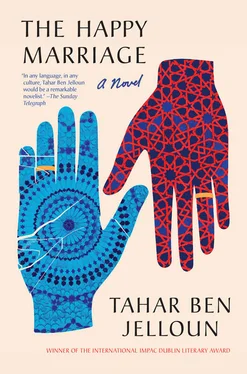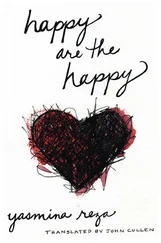He asked to speak to Angèle the next day at the hotel, but it was Maria who answered. He thanked her for the book and suggested taking them to visit a village in the South, which they didn’t know about, but would surely like. However, they had to catch a plane the following day. They exchanged addresses and promised to meet up the next time they passed through Paris.
That evening, he’d tried once again to reach Angèle, who seemed embarrassed by his approaches and had answered the phone rather tersely. He cut the conversation short and regretted calling her in the first place. Ten minutes later, she’d called him back: “I’m out on the street and can speak freely. We’ll write to one another as soon as I’m back, all right? I understand French but I can’t speak it that well!” He’d replied: “My written Spanish isn’t great, but I can try to speak it!”
His instinct hadn’t been wrong. There was a chance something might happen between them. A fling, an adventure, an affair, what did he know?… He felt available, open to any propositions, even the most extravagant. He was trying to free himself from his wife’s clutches. They hadn’t slept together for several months. He felt as though he’d already left her spiritually, even though things were just as they’d always been. He rented a car, abandoned his idea of following Delacroix’s footsteps and headed toward his wife’s ancestral village. He’d kept his room at the hotel in Marrakech in case he changed his mind again. He still nursed both terrible and wonderful memories of that little village in the middle of nowhere.
He got lost several times before coming across the sign that read “Khamsa.” The village was called that because it had five trees, five mosques, and five thousand inhabitants.
A horde of happy children greeted him on his arrival at the entrance of the village, crying, “M’ssiou! M’ssiou!” Some of them were barefoot, while others had a wounded look in their eyes. They answered him in Arabic and made fun of his Northern accent. But he’d thought about them. He pulled notebooks, pencils, and neon pens out of his bag and handed them out. He asked them to show him what they’d drawn the following day.
His wife’s aunts and uncles welcomed him, but they looked very intimidated. They didn’t know what to do in order to please him. Recalling his last visit there with his wife, he’d purchased some medicines in Marrakech and he presented them as a gift.
They thanked him and asked him for news of his wife. The painter assured them that everything was well, that she was looking after the children and the house and that they were happy … It was the first time he’d been there on his own. He felt that he should go there more often, because things there seemed different to him. He found the people there humble, generous, thoughtful, and kindhearted. He told them that he was just passing through, and that he wanted to go up the mountain to draw and take some photos. One of them volunteered to accompany him and help carry his belongings. He was a bright-eyed young man who spoke a little French but not a word of Arabic. He wasn’t even twenty years old and his name was Brek.
Throughout their climb, Brek constantly asked him questions about “Clirmafirane.” It took the painter some time to realize the young man had been talking about Clermont-Ferrand. There was something crazy about hearing the name of that boring town being spoken high up in those mountains. The sky was a deep blue, the views amazing, and the horizon almost stretched out into infinity. Two years earlier, Brek had led a French couple who had been visiting the region on a hike. They had promised him that they would do their best to secure him a visa so he could work for them in their house and look after their garden.
While the painter had been drawing in his large sketchbook, Brek had suddenly said:
“You know, my cousin, your wife had also suggested I go to France. I gave her some passport photos, my passport, and other documents. She told me I could go there soon. That’s why I know so much about Clirmafirane, is that where you live?”
“No, we live in Paris, in the Thirteenth arrondissement. It’s very different from this place.”
“She told me you have a big house and that I could look after the garden.”
“Ah, good!”
“Yes, I will be your gardener.”
“Are you a gardener?”
“No, but the people from Clirmafirane told me the same thing. I’m up to the task. I know how to pull out weeds, dig, water the plants …”
“But you’re going to get married soon. Are you going to leave your wife behind and emigrate?”
“No, my cousin said that my wife could work for you in the house. She said she would get a visa for her too.”
Which was exactly — or almost — what happened a few months later. On his return to Paris after opening an exhibition in Germany, the painter had been surprised to find that a very young woman had been set up in one of his children’s bedrooms. She was very shy and couldn’t speak a word of French or Arabic. When he asked his wife why she’d never spoken to him about it or asked for his opinion, she’d answered very aggressively:
“I know what I’m doing. This girl got married very young and I’ve brought her here so she can go to school, and so she can help me to look after the kids from time to time. As for you, you’re never here, and you don’t know what goes on here when you’re gone, you don’t know how much there is to do. You’re trying to piss me off, is that it? Find something else to do …”
“But you just presented me with a fait accompli!”
“Just like you’ve done!”
He kept his mouth shut, but he saw the extent of the damage that very day. The poor peasant girl was completely out of her element. He found dirty toilet paper strewn all over the floor of the bathroom next to her bedroom. The toilet seat had been completely soiled because she’d stood on top of it and crouched on her haunches because she didn’t know that you could sit on it. Nauseous, he’d left the house. He didn’t say anything to his wife, preferring that she find out on her own. On his way out, he’d peeked into the girl’s room. She’d scattered all her belongings on the bed and had spread the duvet on the floor to sleep at night. The next day, he’d seen her doubled over and red-faced. She’d confused the jar of mustard with jam and had swallowed a huge spoonful of it. He’d also found a metal cap from a bottle of Coca-Cola that had been riddled with holes. She must have tried to open it with her teeth …
That evening, he heard her cry in her room.
The girl went back to her village a month later. The painter felt relieved. But two weeks later, another girl took her place. This new girl had just finished high school and had begun to study biology. He hadn’t been told about her arrival either. Any kind of discussion or protest had been useless. He only asked his wife a single question: “And what about the gardener, when is he coming?” She hadn’t answered him.
The village of Khamsa looked like a dry red spot from the mountain’s summit. There were no oases in its surroundings, nor any greenery or shrubbery of any kind. The painter had told himself that it was a cursed douar, nothing but rocks and thistles. Brek agreed. He talked a lot about the village where he’d been born: “God has forgotten us! We don’t have anything! Very little water, no electricity, no schools, no doctor, nothing, nothing grows here, but we have a lot of cats and dogs who are just as hungry as we are. They come here because we let them go wherever they like. So you see, brother, Clirmafirane is a lot better than this! Do you know why Madame Nicole never wrote to me or replied to any of my letters? And what about your cousin, do you think she’ll keep her word?”
Читать дальше












